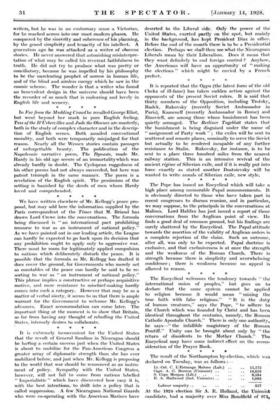We have written elsewhere of Mr. Kellogg's peace pro- posal,
but may add here the information supplied by the Paris correspondent of the Times that M. Briand has drawn Lord Crewe into the conversations. The formula being discussed is "an international pact prohibiting recourse to war as an instrument of national policy." As we have pointed out in our leading article, the League can hardly be expected to go back upon its decision that any prohibition ought to apply only to aggressive war. There must be room for legitimately applied compulsion to nations which deliberately disturb the peace. It is possible that the formula as Mr. Kellogg has drafted it does cover the ground, for Governments who merely act as constables of the peace can hardly be said to be re- sorting to war as "an instrument of national policy." This phrase implies a constructive or perhaps acquisitive motive, and mere resistance to mischief-making hardly comes into such a category. However that may be as a matter of verbal nicety, it seems to us that there is ample warrant for the Government to welcome Mr. Kellogg's advances. Exact accommodation can come later. The important thing at the moment is to show that Britain, so far from having any thought of rebuffing the United States, intensely desires to collaborate.


































 Previous page
Previous page